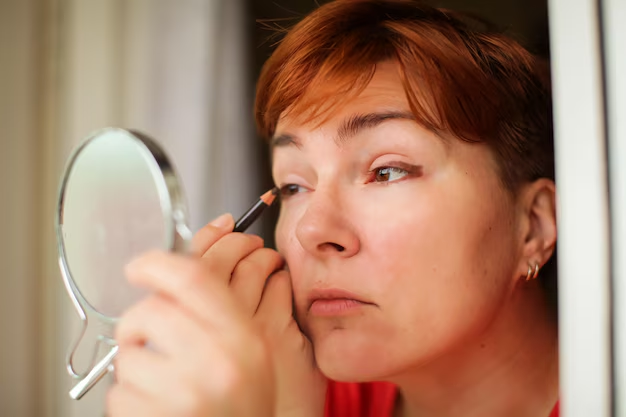Your Guide to How Long After Cataract Surgery Can You Wear Makeup
What You Get:
Free Guide
Free, helpful information about Cataract FAQ and related How Long After Cataract Surgery Can You Wear Makeup topics.
Helpful Information
Get clear and easy-to-understand details about How Long After Cataract Surgery Can You Wear Makeup topics and resources.
Personalized Offers
Answer a few optional questions to receive offers or information related to Cataract FAQ. The survey is optional and not required to access your free guide.
When Can You Start Wearing Makeup After Cataract Surgery? Your Comprehensive Guide
Undergoing cataract surgery marks a significant step towards improving your vision, but it also comes with a myriad of questions about post-surgical care and routine resumption. One such common query involves the timeline for returning to beauty routines, particularly: how long after cataract surgery can you wear makeup?
Navigating this aspect of recovery is crucial, not only to ensure optimal healing but also to integrate back into everyday activities with confidence. This guide aims to provide a comprehensive understanding of makeup use post-surgery, alongside general eye care tips.
👓 Understanding Cataract Surgery and Recovery
Cataract surgery is a widely performed procedure aimed at restoring vision by replacing your eye's cloudy lens with an artificial lens. Recovery is generally rapid, but like any surgery, it requires certain precautions to prevent complications.
What Happens During Recovery?
In the immediate aftermath, your eyes will be sensitive and more susceptible to infection. It's crucial to follow care guidelines, including eye drops usage and avoiding activities that could stress the eyes.
Initial Recovery Phases
- First 24-48 Hours: Your eyes need rest, and any irritation or blurry vision is typically normal. Protective eyewear or patches might be recommended.
- First Week: The healing begins. Activities like reading may require gradual adaptation, and avoiding any eye strain is crucial.
- Subsequent Weeks: Vision should stabilize, but the eyes are still healing internally.
💄 Makeup and Eye Care: What You Need to Know
Post-surgery, introducing makeup too early can elevate the risk of infections and irritation. Here’s a closer look at the cautious approach needed.
Why Is Makeup a Concern?
Makeup particles can easily enter and irritate the eye. The use of brushes, sponges, and even fingers can introduce bacteria, which might lead to infections or delay healing.
General Guidelines for Makeup Post-Surgery
Experts generally advise waiting at least 1 to 2 weeks before resuming makeup application around the eyes. However, individual circumstances might dictate a different timeline. Here are a few pointers:
- Avoid Eye Products: Until you receive a green light from your eye surgeon.
- Use Clean Tools: Even after resumption, ensure applicators and brushes are clean.
- Prioritize Hypoallergenic Products: These are less likely to irritate sensitive eyes.
📝 Practical Tips for Post-Surgery Makeup Routine
Getting back to makeup should be gradual and mindful. Here’s a handy list to ease the transition:
- 👁️ Focus on Non-Eye Makeup First: Foundation and lipstick can usually be resumed earlier if they don't involve the eye area.
- 🧴 New Makeup Products: Consider replacing old makeup to prevent bacterial contamination.
- 🧼 Regular Cleaning: Tools should be sanitized more frequently during this period.
🔍 Related Subtopics: Eye Health and Beauty Care
While waiting on makeup, embrace a broader understanding of maintaining eye health combined with general beauty routines.
Emphasizing Eye Safety
Protecting your eyes isn't just for recovery periods; it's lifelong.
- Invest in Quality Sunglasses: To protect against UV rays, which can further damage or strain healing eyes.
- Adopt a Nutrient-Rich Diet: Foods rich in omega-3 fatty acids, vitamins C and E can support overall eye health.
Broadening Your Skincare Routine
Consider focusing more on skincare to compensate for the temporary absence of makeup:
- Hydration is Key: Keeping your skin moisturized can enhance your natural glow.
- Gentle Cleansers: Avoid harsh contact with eyes and keep the skin around them clean and fresh.
📜 Quick Summary for Post-Surgery Makeup Resumption
Here is a concise, visually engaging summary to highlight the key considerations and tips:
- ⏳ Wait Time: Usually 1-2 weeks for eye makeup.
- 💧 No Eye Products: Until explicitly advised by your eye care professional.
- 🧖♀️ Use Clean Tools: Prevent potential infections.
- 👓 Continue Eye Protection: Sunglasses and protective eyewear remain crucial.
- 🧼 Regular Sanitation: Makeup tools and products should be kept clean and regularly refreshed.
🤔 Final Reflections
Deciding when to reintroduce makeup after cataract surgery involves careful consideration and patient awareness. With your vision restored, embracing cautious eye care can sustain the benefits of surgery and ensure long-term eye health. While your beauty routine is integral to personal expression and confidence, putting your health first is paramount. Always consider personalized advice from healthcare professionals to guide your postoperative journey.
What You Get:
Free Cataract FAQ Guide
Free, helpful information about How Long After Cataract Surgery Can You Wear Makeup and related resources.

Helpful Information
Get clear, easy-to-understand details about How Long After Cataract Surgery Can You Wear Makeup topics.

Optional Personalized Offers
Answer a few optional questions to see offers or information related to Cataract FAQ. Participation is not required to get your free guide.


